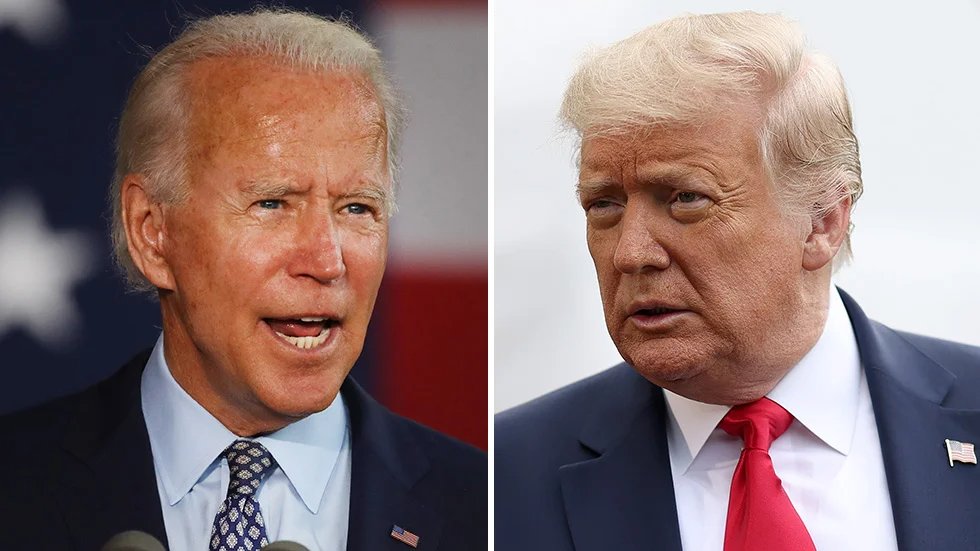Our Guide To The Final Trump-Biden Presidential Debate
WHO, WHAT, WHERE, WHEN & HOW — featuring muted mics.

Though more than 27 million ballots already cast, the presidential race continues to run its course. The show must go on — and now we’re entering its final stage: tomorrow night, President Donald Trump and Democratic nominee Joe Biden are set to face each other one last time for the final presidential debate tonight, October 22, at 9 p.m. EST.
Many topics are to be discussed, including race, climate change, and the ongoing global COVID-19 pandemic. The novel coronavirus is promised to be a particularly hot topic, as the president has recently tested positive (and allegedly recovered from) the omnipresent disease. Just a few weeks ago, it seemed as if the first presidential debate could also be the last, considering the lack of a definite timeline for the President’s recovery and his refusal to participate in virtual events. In lieu of the second debate, the candidates wound up having two dueling town halls on different networks.
With Election Day less than two weeks away, both Trump and Biden will surely have a lot to catch up on. Here’s everything you need to know about the forthcoming discourse, including when and how to tune in if you want to watch.
WHEN AND WHERE:
Belmont University in Nashville, Tennessee on Thursday, October 22, from 9 to 10:30 p.m. EST.
HOW TO WATCH:
Available on all major broadcast networks and cable news channels, as well as streamed by C-SPAN on YouTube here.
WHO’S THE MODERATOR:
The third presidential debate will be moderated by Kristen Welker, NBC News White House correspondent. Though praised by Trump in the past, she has recently become the target of unfounded accusations by the President and his allies. While Trump has called her “extraordinarily unfair” in his recent tweet, Fox News has picked up on the New York Post report alleging that Welker has “deep Democrat ties.” There were also discussions about a photo of Welker with President Obama during a White House Christmas party in 2012, with journalists from different networks joining in on the hot topic.
She’s always been terrible & unfair, just like most of the Fake News reporters, but I’ll still play the game. The people know! How’s Steve Scully doing? https://t.co/uS3EWzfFPy
— Donald J. Trump (@realDonaldTrump) October 17, 2020
Brian Kilmeade is mad that NBC's Kristen Welker is going to moderate Thursday's debate, because her parents donated to Democrats and "she was a registered Democrat before," even though Kilmeade's colleague/first debate moderator Chris Wallace is currently a registered Democrat. pic.twitter.com/L59N2jZ7rl
— Bobby Lewis (@revrrlewis) October 19, 2020
Back when I was covering the Hill, I abused the access my press pass gave me to the Hill and gave my mom a tour. She got to meet @newtgingrich & he sent this photo, which hung on her wall the rest of her life. Apparently I’m irredeemably compromised: pic.twitter.com/qdGX8WgQe5
— Karen Tumulty (@ktumulty) October 17, 2020
WHAT’S TO BE DISCUSSED:
On October 16, the Commission on Presidential Debates announced that Welker selected six topics for the upcoming debate: Fighting COVID-19, American Families, Race in America, Climate Change, National Security, and Leadership. A 15-minute segment will be allocated to each of the topics; Welker will ask a question, Trump and Biden will each have two minutes to respond, and then have an opportunity to respond to each other before the moderator dives deeper into the topic for further discussion.
The Trump campaign has complained about the topic being selected: the campaign manager Bill Stepien wrote that they had expected the third debate to be about foreign policy, which the campaign said was customary. Though true in some instances, this is not a rule carved in stone: take the 2016 third presidential debate between Trump and Hillary Clinton that covered domestic topics like the Supreme Court, or the 2008 final presidential debate between Obama and John McCain that was all about domestic policy.
NEW RULES:
With the first debate being largely unproductive and chaotic due to interruptions and Trump’s refusal to abide by guidelines, the Commission on Presidential Debates has acknowledged that “additional structure should be added to the format of the remaining debates to ensure a more orderly discussion of the issues.”
The “structure” in question is the microphone — each candidate’s mic will now be cut while the other candidate is speaking for an uninterrupted two-minute period to avoid the shouting and disorder that took place on September 29. The other 11 minutes of each segment — the open discussion portion — will not feature a mic-muting option, though the commission noted that “time taken up during any interruptions will be returned to the other candidate.
Discover More
